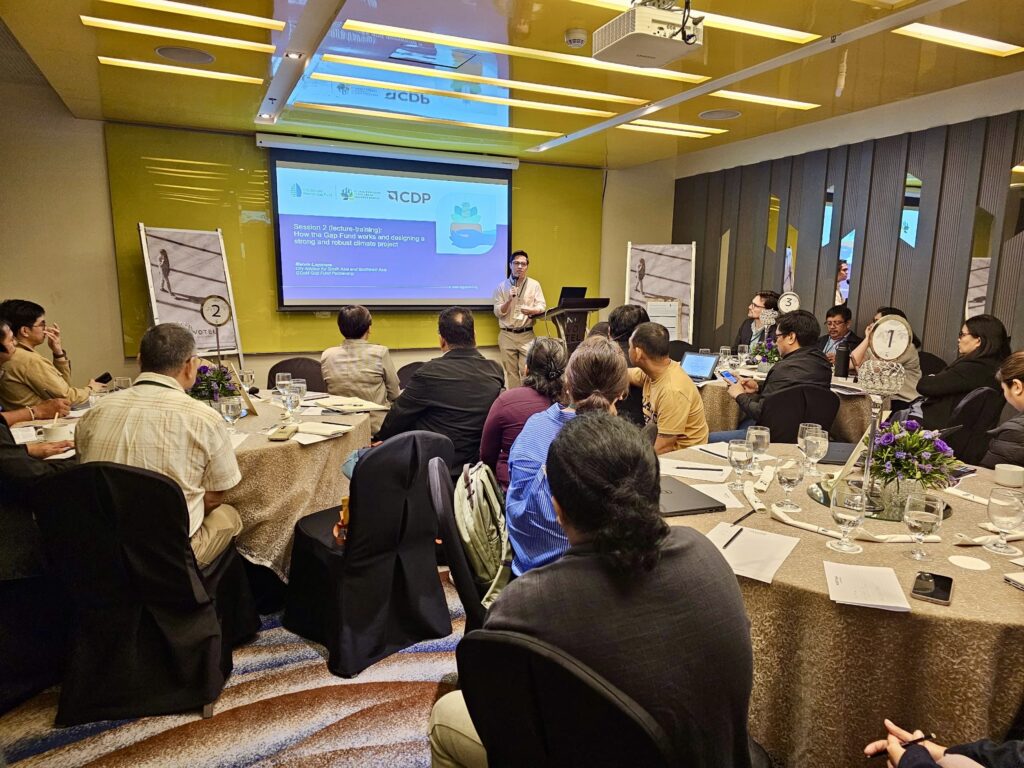
Building Climate Resilience in Philippine Cities Through a Collaborative Approach: The GCoM-Gap Fund Partnership and CDP Co-Host Roundtable Discussion
The GCoM-Gap Fund Partnership and CDP jointly organized a roundtable discussion “Multi-city Climate Resilience Project Collaboration for Philippine Cities” on 28 March 2025 in Quezon City, Philippines. The event provided a platform for Philippine cities and key partners to explore early project preparation support for climate resilience projects, and discuss potential joint applications.
The event convened 28 city government representatives and partners, including the World Bank, International Finance Corporation (IFC), GIZ Philippines, the League of Cities of the Philippines, and the Department of Interior and Local Governments (DILG).
Representatives from Pasig, Quezon City, Makati, Ormoc, Baguio and Parañaque shared their climate challenges and priority project preparation needs, with a focus on collaborative and inter-city approaches for high-impact and scalable projects.
In his opening address at the workshop, Bede Hampton, Manager for APAC Cities, States and Regions at the CDP, highlighted that recent findings from the CDP 2024 Disclosure Data showed critical opportunities in solid waste management, renewable energy, and nature-based adaptation solutions, with many projects remaining in the early stage of project preparation, seeking additional funding or full financing. The roundtable gathered cities disclosing projects to CDP in 2024 to explore how the Gap Fund can support their climate initiatives and identify necessary facilitation from the national government and key development partners for effective collaboration.
Jazlyn Lee, Engagement Lead for Southeast Asia and South Asia, and Marvin Lagonera, City Advisor for Southeast Asia and South Asia of the GCoM-Gap Fund Partnership, facilitated breakout group discussions and provided hands-on coaching to help cities in raising their confidence in developing Expression of Interest in applying for technical assistance. They also provided an overview of good practices and key considerations for designing a strong and robust climate project. Representatives from the World Bank and the IFC also provided feedback to improve the cities’ project proposals.
Engineer Raoul Cam, City Planning and Development Coordinator for Ormoc City Government, highlighted that joining the event enabled him to build a clear understanding of the Gap Fund: “Before the workshop, I was not fully familiar with the coverage and the process for accessing the Gap Fund. The group exercise also gave me the opportunity to interact with other local government units (LGUs), and learn from them their various concerns and the strategies to address the gaps. The workshop provided very relevant insights on the need to develop a good proposal to access funds and enhance the capacities of LGUs.”
Urban Priorities in Renewable Energy, Flood Management, and Solid Waste Management
Cities including those from Metro Manila identified shared challenges and support needs in renewable energy, flood management, and solid waste management.
In renewable energy and solarization, cities highlighted rising electricity demand, extreme weather, and the urban heat island effect. They need technical support for energy audits, identifying solar sites, enhancing building standards, engaging the private sector, and analyzing clean energy options like the DOE’s Green Energy Option Program (GEOP).
Metro Manila cities stressed the need for integrated, nature-based flood solutions, such as detention ponds, guided by a regional framework. They also pointed to gaps in proposal development and financing access.
In solid waste management, cities like Quezon City and Pasig face growing waste volumes, poor segregation, and lack of strategies for organic waste. Proposed actions include biodigester deployment, circular economy approaches, and better collaboration with the informal sector, alongside needs for cost-benefit analysis and emissions accounting.
Collaboration for Impact and Financial Aggregation
The Gap Fund supports multi-city collaboration to overcome financial, scale, and delivery challenges. During the workshop, cities identified shared priorities for potential joint submissions, reinforcing the value of regional cooperation.
Engineer Cam highlighted how collaboration helps cities share resources, align solutions, and learn from best practices, while Kelvin Tagnipez, APEX Cities Engagement Lead at IFC, added that a multi-city approach can increase impact and attract investment through a consolidated pipeline, making municipal finance more viable.
Since its launch in 2020, the Gap Fund has helped rapidly growing cities turn climate goals into finance-ready projects. Through its partnership with GCoM and CDP Asia Pacific, it supports early-stage project preparation—often the biggest hurdle to accessing climate finance. The GCoM–Gap Fund Partnership will continue working with CDP to expand activities in Southeast and South Asia and provide tailored coaching to Philippine cities to develop strong multi-city Expressions of Interest.